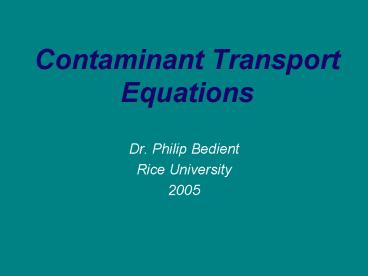Contaminant Transport Equations - PowerPoint PPT Presentation
1 / 17
Title:
Contaminant Transport Equations
Description:
The process by which solutes are transported by the bulk of motion ... 1-D soil column breakthru curves. Co. L. vx. C/C0. t. t = L/vx. Solution can be written: ... – PowerPoint PPT presentation
Number of Views:110
Avg rating:3.0/5.0
Title: Contaminant Transport Equations
1
Contaminant Transport Equations
- Dr. Philip Bedient
- Rice University
- 2005
2
Transport Processes
- Advection
- The process by which solutes are transported by
the bulk of motion of the flowing ground water. - Nonreactive solutes are carried at an average
rate equal to the average linear velocity of the
water. - Hydrodynamic Dispersion
- Tendency of the solute to spread out from the
advective path - Two processes
- Diffusion (molecular)
- Dispersion
3
Diffusion
- Ions (molecular constituents) in solution move
under the influence of kinetic activity in
direction of their concentration gradients. - Occurs in the absence of any bulk hydraulic
movement - Diffusive flux is proportional to concentration
gradient, in accordance to Ficks First Law. - Where Dm diffusion coefficient (typically 1 x
10-5 to - 2 x 10-5cm2/s for major ions in ground water)
4
Diffusion (continued)
- Ficks Second Law - derived from Ficks First Law
and the Continuity Equation - called Diffusion
Equation
5
Advection Dispersion Equation -Derivation (F is
transport)
Assumptions 1) Porous medium is homogenous 2)
Porous medium is isotropic 3) Porous medium is
saturated 4) Flow is steady-state 5) Darcys
Law applies
6
Advection Dispersion Equation
In the x-direction Transport by advection
Transport by dispersion Where
average linear velocity n porosity
(constant for unit of volume) C
concentration of solute dA elemental
cross-sectional area of cubic element
7
Hydrodynamic Dispersion Dx caused by variations
In the velocity field and heterogeneities
where dispersivity L Molecular
diffusion
8
- Flux (mass/area/time)
- (-) sign before dispersion term indicates that
the contaminant moves toward lower concentrations - Total amount of solute entering the cubic element
- Fxdydz Fydxdz Fzdxdy
9
- Difference in amount entering and leaving element
- For nonreactive solute, difference between flux
in and out amount accumulated within element - Rate of mass change in element
10
- Equate two equations and divide by dV dxdydz
- Substitute for fluxes and cancel n
- For a homogenous and isotropic medium, is
steady and uniform.
11
- Therefore, Dx, Dy, and Dz do not vary through
space. - Advection-Dispersion Equation 3-D
12
- In 1-Dimension, the Ad - Disp equation becomes
Accumulation Advection Dispersion
13
- CONTINUOUS SOURCE
- Soln for 1-D EQN for can be found using LaPlace
Transform - 1-D soil column breakthru curves
Co
C/C0
vx
L
t
t L/vx
14
- Solution can be written
- or, in most cases
- Where
(Ogato Banks, 1961)
Tabulated error function
15
Instantaneous SourcesAdvection-Dispersion Only
- Instantaneous POINT Source 3-D
- M C0V
- D (DxDyDz)1/3
Continuous Source
16
- Instantaneous LINE Source 2-D Well
- With First Order Decay
T2
T1
Source Plan View
x
17
- Instantaneous PLANE Source - 1 Dimension
- Adv/Disp Equation
C/C0
t
T L/vx
L































